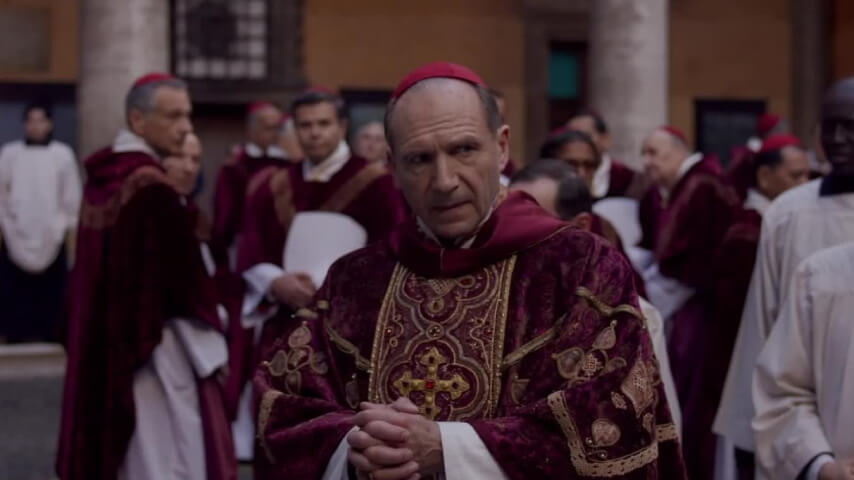Spoiler Space: The middlebrow soap of Conclave belies its complicated, left-field ending
The twisty airport papalback thrills culminate in a reveal the movie is ill-equipped to handle.
Photo: Focus Features
Spoiler Space offers thoughts on, and a place to discuss, the plot points we can’t disclose in our official review. Fair warning: This article features plot details of Conclave.
Conclave, the beautifully framed and oppressively scored film from All Quiet On The Western Front Oscar winner Edward Berger, could’ve been called Pope Detective. We all still would’ve watched something called Pope Detective and then the film itself would’ve been more honest about its pulpy plotting. Though the film is receiving considerable awards attention for being a respectable-looking ensemble drama for grown-ups, a rare enough designation to be sure, Conclave is also perfectly silly as it rolls out twist after twist. Literal bombshells drop upon a collection of Cardinals as they attempt to elect a new pope, each new scene of skullduggery or vote-whipping as lurid as any scheming episode of Game Of Thrones. But the final reveal, the big rug-pull that the film constantly telegraphs, is where Conclave actually gets interesting. Now that the film is streaming on Peacock, it’s worth diving fully into its goofy deep end.
After the sitting Pope dies of natural causes, the Church calls in all its Cardinals to figure out who’s going to take his place. Turns out, though, that a group of older Catholic men have some skeletons in their robe-filled closets! Enter Ralph Fiennes’ Thomas Lawrence, PI (Pope Investigator). Lawrence, presiding over the conclave, has his personal politics—more liberal-leaning than some of the one-dimensional reactionaries around him—but he’s mostly a good-hearted Columbo whose curiosity just keeps getting in the way. Bribery, secret children, photocopied evidence, and constant breaching of the sequestered voter’s info-bubble all contribute to the soapy camp of Conclave’s airport papalback story. Yet, around all this more conventional political drama lurks the spotlit mystery of Vincent Benitez (Carlos Diehz), whom the Pope made Archbishop of Kabul in secret.
From the moment he arrives, Benitez is near-silent, almost uncomfortably beatific, and obviously important to the film’s script. In a conclave dominated by brashly conservative African and European blocs composed of already-thin characters, the Mexican Benitez’s quietly progressive serenity can threaten to careen away from Christlike towards “enlightened minority” cartoonishness. Yet Diehz, an acting newcomer, shoulders this burden well, fleshing out the role with amused glances and earnest conviction. As Benitez acquires votes—slowly at first, then rapidly after making a defiant and loving speech about his experience in war zones—the only question remaining around Chekhov’s Cardinal is what, exactly, is going on with the hush-hush hospital visits he’d made.
 Keep scrolling for more great stories.
Keep scrolling for more great stories.
